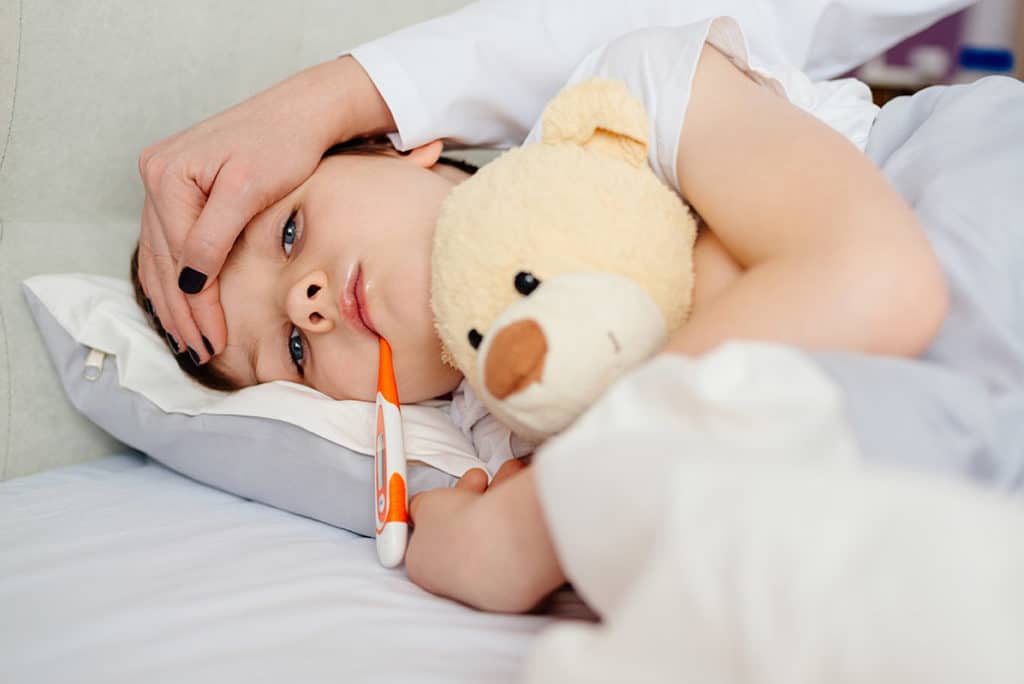Do Babies Sleep A Lot When Sick

Introduction
Do Babies Sleep A Lot When Sick: The relationship between a baby’s sleep patterns and their health, particularly during illness, is a topic that garners attention and concern among parents. The impact of sickness on a baby’s sleep is a multifaceted aspect of infant care, and understanding these dynamics is crucial for providing appropriate care and support. This introduction delves into the question of whether babies tend to sleep more when they are sick, exploring the nuances of sleep behavior as it relates to their overall well-being.
The association between illness and changes in sleep patterns is not a one-size-fits-all scenario. While it is a common observation that many adults experience increased fatigue and a desire to sleep more when unwell, the dynamics are different for infants. The response to illness varies widely among babies, influenced by factors such as the nature and severity of the illness, the baby’s age, and individual variations in temperament and resilience.
Some babies may indeed exhibit increased sleepiness when they are sick. The body’s immune response to illness often requires additional energy, and sleep can be a restorative mechanism. Furthermore, certain illnesses may cause discomfort, fatigue, or an overall feeling of unwellness, prompting babies to seek solace in extended periods of sleep.
:max_bytes(150000):strip_icc()/Boy-Lying-Down-With-Fever-5a8609defa6bcc00371e0272.jpg)
Should I let baby sleep more when sick?
Let your baby sleep more if that’s what they need.
Let them! That is your child’s way of trying to fight off the illness, and rest is key in doing so.
Restorative Benefits: Sleep is a vital component of the body’s immune response. During sleep, the body releases hormones that support healing, repair tissues, and strengthen the immune system. Allowing a sick baby to sleep more provides the necessary conditions for these restorative processes to occur.
Energy Conservation: When a baby is sick, their body may be expending extra energy to combat illness. Allowing extended sleep periods helps conserve energy, allowing the body to focus on recovery rather than daily activities.
Fever Management: Many illnesses, such as viral infections, can cause fever in infants. Fever often leads to increased fatigue, and letting the baby sleep more assists in managing this symptom. Adequate sleep can help regulate body temperature and alleviate some discomfort associated with fever.
Comfort and Soothing: Sleep provides a natural form of comfort and soothing. Babies, like adults, may seek solace in sleep when feeling unwell. Allowing them to sleep more can contribute to their overall sense of comfort during illness.
Should I let my sick child sleep all day?
Should I let my child sleep when they’re not feeling well? The best way for you to help your child recover is to let them to rest, allowing their immune system to fight the illness. Don’t be concerned if your child is sleeping more than usual or eating less for a few days.
Restorative Benefits: Sleep is a vital component of the body’s immune response. During sleep, the body releases hormones that support healing, repair tissues, and strengthen the immune system. Allowing a sick child to sleep more provides an opportunity for these restorative processes to take place.
Fever Management: Illnesses, especially those accompanied by fever, can lead to increased fatigue. Allowing a sick child to sleep helps manage fatigue associated with fever, contributing to their overall comfort.
Energy Conservation: When a child is sick, their body may be using extra energy to combat illness. Allowing extended sleep periods helps conserve energy, allowing the body to focus on recovery rather than everyday activities.
Comfort and Soothing: Sleep provides a natural form of comfort and soothing. Allowing a sick child to sleep as much as they need can contribute to their overall sense of comfort and well-being during illness.
Are babies more sleepy when they have a cold?
Do Babies Sleep More When They Have a Cold or Illness? In general, when your baby is sick they will sleep more. That said, depending on the type of illness or cold your baby has, they may struggle to get the sleep they need and that can make it hard on baby and you.
Energy Conservation: Fighting off an infection demands energy from the body. Sleep is a natural way for the body to conserve energy and redirect it towards the immune response.
Fever and Fatigue: Many colds are accompanied by a fever, which can cause fatigue. The body’s attempt to regulate temperature and combat the virus can leave babies feeling more tired than usual.
Disrupted Sleep Patterns: Illnesses, especially those affecting the respiratory system, can lead to disrupted sleep patterns. Babies may wake more frequently during the night due to congestion or discomfort, leading to increased daytime sleepiness.
Enhanced Immune Response: Sleep is intricately linked to the immune system. During sleep, the body produces immune-boosting substances that aid in the recovery process. Babies may naturally sleep more to support their immune response.
When should I be concerned about my sick baby?
Contact your health care provider if your baby has a cold that interferes with his or her breathing, has symptoms that last longer than 10 days, has ear pain, or has a cough that lasts more than one week.
Difficulty Breathing: If a baby is struggling to breathe, showing signs of rapid or labored breathing, or demonstrating persistent wheezing or grunting, seek medical attention promptly.
Dehydration: Signs of dehydration in a baby include sunken fontanelle (soft spot on the baby’s head), dry mouth, lack of tears when crying, and significantly fewer wet diapers. Dehydration can escalate quickly, and medical intervention is necessary.
High Fever: A fever in a baby can be concerning, especially if it is persistent or accompanied by other worrisome symptoms. Seek medical advice if a baby under three months has a temperature of 100.4°F (38°C) or higher, or if an older baby’s fever is consistently high.
Refusal to Eat: If a sick baby is refusing to feed and showing signs of persistent lethargy, it may indicate a more serious issue that requires medical attention.
Persistent Vomiting or Diarrhea: Continuous vomiting or diarrhea can lead to dehydration, which is a significant concern in babies. If these symptoms persist, especially in conjunction with other signs of distress, seek medical advice.

Do babies drink less milk when sick?
Due to the inflammation of a sore little throat, associated with a cold, your baby may start to refuse to breastfeed or may want to breastfeed for shorter periods. If this happens, offer your baby the breast often and let them guide you on how long they feed for.
Discomfort: When babies are unwell, they may experience discomfort due to symptoms such as congestion, sore throat, or earache. This discomfort can make feeding less appealing.
Nasal Congestion: Respiratory illnesses, such as colds, can cause nasal congestion, making it difficult for babies to breathe while sucking. This discomfort can lead to a decreased desire to feed.
Decreased Sense of Smell and Taste: Illnesses can impact a baby’s sense of smell and taste, diminishing the appeal of milk. This is particularly true if the baby has a cold or congestion, limiting their ability to fully appreciate the flavors of breast milk or formula.
General Fatigue: Fighting off an illness requires energy, and babies may feel more fatigued than usual. This increased tiredness can affect their interest in feeding.
Fever: Elevated body temperature due to fever can contribute to dehydration, affecting a baby’s overall desire to drink milk.
Why is my baby suddenly so sleepy?
Some of the most common reasons that healthy babies sleep for longer than usual include the following: They may experience a growth spurt or developmental leap. They may have a minor illness, such as a cold. They may have a serious infection.
Growth Spurt: Babies go through rapid periods of growth, and during these phases, they may require more sleep. If your baby is experiencing a growth spurt, increased sleepiness can be a normal response.
Illness or Infection: Sickness or infection can lead to fatigue and increased sleepiness in babies. The body directs energy towards fighting off the illness, often resulting in the need for more rest.
Teething: The teething process can be physically taxing for babies, causing discomfort and irritability. This discomfort may lead to increased sleepiness as the baby’s body works to manage the stress associated with teething.
Developmental Milestones: Learning new skills or reaching developmental milestones, such as crawling or sitting up, can be mentally and physically exhausting for babies. The added effort might contribute to increased sleepiness.
Overstimulation: If a baby experiences a period of heightened stimulation, whether from new environments, visitors, or excessive play, they may become overtired, resulting in increased sleepiness as the body attempts to recover.
How much sleep is normal for sick child?
Babies and kids need will more sleep when they’re sick, so longer or extra naps are good and expected, however, they still need calories and hydration. We recommend waking your little one at the three hour mark during the day to make sure they’re getting plenty of sleep but also plenty of food and water.
Infants (0-12 months): Babies in this age group typically require a substantial amount of sleep, ranging from 14 to 17 hours a day. During illness, it’s not uncommon for a sick infant to sleep even more, as their bodies focus on recovery.
Toddlers (1-2 years): Toddlers generally need around 11 to 14 hours of sleep per day. When unwell, they may require additional nap times or longer periods of nighttime sleep to support their immune systems and aid in healing.
Preschoolers (3-5 years): Preschool-aged children usually need 10 to 13 hours of sleep per day. During illness, they may experience increased fatigue, leading to longer nap times or more extended nighttime sleep.
School-Aged Children (6-12 years): Children in this age range typically need 9 to 12 hours of sleep. When sick, they may need additional rest to recover, and daytime napping might increase.
What does a sick baby cry sound like?
Listen for: Constant crying that doesn’t stop even when the baby is fed, comforted or sleeping. Cries that indicate signs of illness often sound like weak, tired moans. They are usually high pitched with low intensity.
Fussiness: Sick babies often display increased fussiness and irritability. Their cries may sound more persistent or intense compared to their usual cries, reflecting their discomfort or distress.
Weak or Hoarse Cry: Some illnesses, particularly those affecting the respiratory system, can lead to a weaker or hoarser cry. Congestion or throat discomfort may influence the sound of the baby’s cry.
Unsettled Crying: A sick baby may appear more unsettled during crying episodes. They may be difficult to console, and their cries might be punctuated by moments of restlessness or discomfort.
Changes in Pitch: Illness can impact a baby’s overall well-being, and this may be reflected in changes in the pitch or tone of their cry. Parents may notice a difference in how their baby’s cry sounds during periods of illness.
Crying During Feeding: If a baby is experiencing discomfort while feeding due to issues such as congestion, earache, or a sore throat, their cries during or after feeding may have a different quality.

Conclusion
While it is common for some babies to exhibit increased sleepiness when unwell, using sleep as a restorative mechanism, others may experience disrupted sleep patterns due to discomfort, pain, or the overall impact of illness on their well-being. Understanding these variations is pivotal for parents and caregivers as they navigate the challenges of caring for a sick baby.
The observations and cues provided by a sick baby serve as valuable indicators of their needs and the severity of their illness. Some babies may seek solace in longer sleep periods, allowing their bodies to allocate resources to the healing process. On the contrary, those experiencing discomfort may struggle with achieving restful sleep, leading to more fragmented or disrupted sleep cycles.
The overarching theme in caring for a sick baby involves a delicate balance of responsiveness, observation, and adaptability. Parents must remain attuned to the individual signals their baby presents, whether it be a desire for more sleep or a need for comfort and attention during wakeful periods.




